| Listing 1 - 10 of 37 | << page >> |
Sort by
|
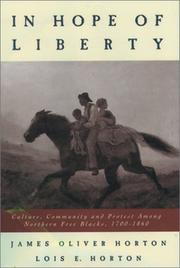
ISBN: 1280530200 1423760190 019535236X 1602563187 9781423760191 9781280530203 0195124650 9780195124651 9781602563186 019504732X 9780195047325 0199880794 0197713858 Year: 1998 Publisher: New York : Oxford University Press,
Abstract | Keywords | Export | Availability | Bookmark
 Loading...
Loading...Choose an application
- Reference Manager
- EndNote
- RefWorks (Direct export to RefWorks)
Covering the colonial period to the Civil War and spanning all of the northern United States, this text documents the antebellum northern black experience. It demonstrates the central role of the black community in successfully managing the tensions born of assimilation and cultural difference.
African Americans --- Free African Americans --- Free Afro-Americans --- Free blacks --- History --- History. --- Free Black people
Book
ISBN: 1283251124 9786613251121 0252091361 9781283251129 9780252091360 Year: 2004 Publisher: Urbana : University of Illinois Press,
Abstract | Keywords | Export | Availability | Bookmark
 Loading...
Loading...Choose an application
- Reference Manager
- EndNote
- RefWorks (Direct export to RefWorks)
Women, Black --- Free black people --- Slavery --- History. --- America --- Social conditions. --- Race relations. --- Free blacks --- Free Black people
Book
ISBN: 0813933102 1283705532 9780813933108 9780813933092 0813933099 9781283705530 Year: 2012 Publisher: Charlottesville : University of Virginia Press,
Abstract | Keywords | Export | Availability | Bookmark
 Loading...
Loading...Choose an application
- Reference Manager
- EndNote
- RefWorks (Direct export to RefWorks)
With this reinsertion of individual free blacks into the neighborhood, community, and county, he exposes a different, more complicated image of the lives of free people of color.
Free African Americans --- Free Afro-Americans --- Free blacks --- African Americans --- Social conditions --- History --- Albemarle County (Va.) --- Albemarle Co., Va. --- Race relations. --- Free Black people
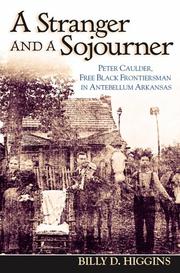
ISBN: 1610754069 9781610754064 1557288054 9781557288059 Year: 2004 Publisher: Fayetteville, [Arkansas] : The University of Arkansas Press,
Abstract | Keywords | Export | Availability | Bookmark
 Loading...
Loading...Choose an application
- Reference Manager
- EndNote
- RefWorks (Direct export to RefWorks)
Free African Americans --- African American pioneers --- Afro-American pioneers --- Pioneers, African American --- Pioneers --- Free Afro-Americans --- Free blacks --- African Americans --- History --- Caulder, Peter, --- Arkansas --- Free Black people
Book
ISBN: 1442262249 0742551156 9780742551152 9780742551145 0742551148 Year: 2014 Publisher: Lanham, Maryland : Rowman & Littlefield,
Abstract | Keywords | Export | Availability | Bookmark
 Loading...
Loading...Choose an application
- Reference Manager
- EndNote
- RefWorks (Direct export to RefWorks)
Between Slavery and Freedom explores one of the central ironies of racial dynamics in this nation's history from the colonial era to the end of the Civil War.
Free African Americans --- Free Afro-Americans --- Free blacks --- African Americans --- History. --- Social conditions. --- Attitudes --- History --- United States --- Race relations --- Free Black people
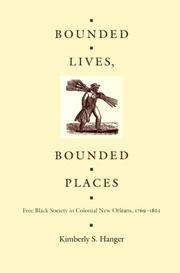
ISBN: 1283062534 9786613062536 0822382075 0822318989 0822319063 Year: 1997 Publisher: North Carolina Duke University Press
Abstract | Keywords | Export | Availability | Bookmark
 Loading...
Loading...Choose an application
- Reference Manager
- EndNote
- RefWorks (Direct export to RefWorks)
During Louisiana's Spanish colonial period, economic, political, and military conditions combined with local cultural and legal traditions to favor the growth and development of a substantial group of free blacks. In Bounded Lives, Bounded Places, Kimberly S. Hanger explores the origin of antebellum New Orleans' large, influential, and propertied free black-or libre-population, one that was unique in the South. Hanger examines the issues libres confronted as they individually and collectively contested their ambiguous status in a complexly stratified society.Drawi
Free African Americans --- Spaniards --- Spanish people --- Ethnology --- Free Afro-Americans --- Free blacks --- African Americans --- History --- New Orleans (La.) --- Louisiana --- History. --- Free Black people
Book
ISBN: 1108671098 110869540X 110846999X 1108664725 Year: 2019 Publisher: Cambridge : Cambridge University Press,
Abstract | Keywords | Export | Availability | Bookmark
 Loading...
Loading...Choose an application
- Reference Manager
- EndNote
- RefWorks (Direct export to RefWorks)
Between 1822 and 1857, eight Southern states barred the ingress of all free black maritime workers. According to lawmakers, they carried a 'moral contagion' of abolitionism and black autonomy that could be transmitted to local slaves. Those seamen who arrived in Southern ports in violation of the laws faced incarceration, corporal punishment, an incipient form of convict leasing, and even punitive enslavement. The sailors, their captains, abolitionists, and British diplomatic agents protested this treatment. They wrote letters, published tracts, cajoled elected officials, pleaded with Southern officials, and litigated in state and federal courts. By deploying a progressive and sweeping notion of national citizenship - one that guaranteed a number of rights against state regulation - they exposed the ambiguity and potential power of national citizenship as a legal category. Ultimately, the Fourteenth Amendment recognized the robust understanding of citizenship championed by Antebellum free people of color, by people afflicted with 'moral contagion'.
Free African Americans --- Free Blacks --- Merchant mariners, Black --- Free Negroes --- Free people of color --- Free persons of color --- Blacks --- Black merchant mariners --- Merchant mariners --- Free Afro-Americans --- Free blacks --- African Americans --- Legal status, laws, etc. --- History --- United States --- Foreign relations --- Black people --- Free Black people --- Negro Seamen Acts
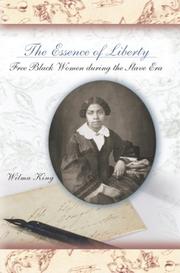
ISBN: 0826265278 9780826265272 0826216579 9780826216571 0826216609 9780826216601 9780826216571 9780826216601 0826216579 0826216609 Year: 2006 Publisher: Columbia University of Missouri Press
Abstract | Keywords | Export | Availability | Bookmark
 Loading...
Loading...Choose an application
- Reference Manager
- EndNote
- RefWorks (Direct export to RefWorks)
"King uses a wide range of sources to examine the experiences of free black women in both the North and the South, from the colonial period through emancipation, showing how they became free, educated themselves, found jobs, maintained self-esteem, and developed social consciousness--even participating in the abolitionist movement"--Provided by publisher.
Free African Americans --- African American women --- Liberty --- Afro-American women --- Women, African American --- Women, Negro --- Women --- Free Afro-Americans --- Free blacks --- African Americans --- History. --- Social conditions. --- Intellectual life. --- History --- United States --- Race relations. --- Race question --- Free Black people
Book
ISBN: 0814724868 0814724973 9780814724972 0814724310 9780814724316 9780814724316 9780814724866 Year: 2014 Publisher: New York, NY : New York University Press,
Abstract | Keywords | Export | Availability | Bookmark
 Loading...
Loading...Choose an application
- Reference Manager
- EndNote
- RefWorks (Direct export to RefWorks)
No American city’s history better illustrates both the possibilities for alternative racial models and the role of the law in shaping racial identity than New Orleans, Louisiana, which prior to the Civil War was home to America’s most privileged community of people of African descent. In the eyes of the law, New Orleans’s free people of color did not belong to the same race as enslaved Africans and African-Americans. While slaves were “negroes,” free people of color were gensde couleur libre, creoles of color, or simply creoles. New Orleans’s creoles of color remained legally and culturally distinct from “negroes” throughout most of the nineteenth century until state mandated segregation lumped together descendants of slaves with descendants of free people of color. Much of the recent scholarship on New Orleans examines what race relations in the antebellum period looked as well as why antebellum Louisiana’s gens de couleur enjoyed rights and privileges denied to free blacks throughout most of the United States. This book, however, is less concerned with the what and why questions than with how people of color, acting within institutions of power, shaped those institutions in ways beyond their control. As its title suggests, Making Race in the Courtroom argues that race is best understood notas a category, but as a process. It seeks to demonstrate the role of free people of African-descent, interacting within the courts, in this process.
SOCIAL SCIENCE / Discrimination & Race Relations. --- LAW / Legal History. --- HISTORY / United States / General. --- Louisiana Purchase --- Louisiana --- Free African Americans --- Free Afro-Americans --- Free blacks --- African Americans --- Social aspects. --- History --- Legal status, laws, etc. --- Free Black people --- SOCIAL SCIENCE / Discrimination
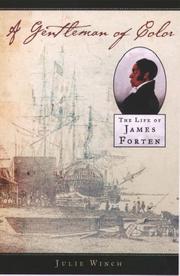
ISBN: 0195086910 9780195086911 1429401214 9781429401210 1280527218 9781280527210 9786610527212 6610527210 0190282193 0195163400 0198024762 0197713432 Year: 2023 Publisher: New York ; Oxford University Press,
Abstract | Keywords | Export | Availability | Bookmark
 Loading...
Loading...Choose an application
- Reference Manager
- EndNote
- RefWorks (Direct export to RefWorks)
James Forten began his career as a soldier before becoming the leading sailmaker in Philadelphia and a leader in the black community's reform activities. He served as vice-president of the American Anti-Slavery Society. This is his biography.
African American abolitionists --- African American businesspeople --- African American soldiers --- African Americans --- Free African Americans --- Sailmakers --- Artisans --- Free Afro-Americans --- Free blacks --- Afro-American businesspeople --- Afro-Americans in business --- Businesspeople, African American --- Negro businessmen --- Negroes as businessmen --- Businesspeople --- History --- Forten, James, --- Philadelphia (Pa.) --- E-books --- Free Black people --- Forten, James.
| Listing 1 - 10 of 37 | << page >> |
Sort by
|

 Search
Search Feedback
Feedback About UniCat
About UniCat  Help
Help News
News